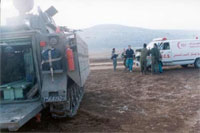
"Why is that ambulance waiting?" I ask a young Israeli soldier at Qalandia checkpoint, which is one of several checkpoints on the road to Jerusalem, as I was heading into Jerusalem one cold, dark and rainy evening.
"They looked suspicious," he replies curtly.
"Which one?" I ask. "The man with cancer or the woman who just had a heart attack?"
"We must check everyone's ID for security reasons," he says.
"So why are regular cars being allowed through within minutes of reaching the front of the line, while this ambulance has been waiting for more than 45 minutes?" I ask.
"We are busy," he says.
"How much longer will it take? There are sick people in that ambulance."
"They can go to Ramallah if they want. Why do they come to our hospitals?"
"They are going to east Jerusalem," I say. "There are lots of Palestinian hospitals there."
"NO! Its all ours," he yells at me. "GO AWAY!"
I find the soldier's supervisor and follow the same line of questioning.
"How can you check the IDs of all these people in line and in their cars in a matter of minutes, while that ambulance has been sitting there for 45 minutes? Aren't you worried that something will happen to them?"
"Nothing will happen to them," he says.
"What if they die?" I ask.
"I don't care," he replies.
"Would you care if it was your family in that ambulance?"
Same response. "GO AWAY" he yells.
It's a scene whose frequency has become frighteningly familiar to many Palestinians. Bright red lights flashing rapidly amidst loud sirens waiting in front of cement barricades, a sniper tower, possibly a tank or two and young armed Israeli occupation soldiers armed with the power to arbitrarily decide the fate of a Palestinian's life.
By international standards, by humanitarian standards, by ethical standards, the flashing lights, the sirens, the marked vehicle, the paramedics wearing clearly identifiable uniforms are recognized as an indicator of the need for urgent passage, for humanitarian aid to be administered. The 4th Geneva Convention specifies that the wounded and sick, as well as the infirm and expectant mothers shall be the object of particular protection and respect.
However, by Israeli occupation standards, there is no such protection and respect. In fact, the sick and dying trying to gain passage via ambulance to hospitals are one more opportunity for occupation soldiers to facilitate the death of the dying.
On route to Ramallah, ambulances of the Palestinian Red Crescent Society (PRCS) can often be spotted sitting on a dusty roadside checkpoint awaiting the occupier's decision to either pass or be turned away, to make it to the hospital in time or to sit and wait, to live or to die. At the District Coordinating Office (DCO) checkpoint, ambulances wait. At Surda checkpoint, ambulances wait. At Qalandia checkpoint, ambulances wait. At Howwara checkpoint, ambulance wait. At the more than 200 checkpoints in the West Bank and Gaza, ambulances can be seen waiting.
Since September 28, 2000 to November 21,2002, 557 PRCS ambulances were denied passage through illegal Israeli checkpoints. More than 190 medical personnel were injured and 3 were killed. Some 212 ambulances were attacked, 28 of them beyond repair.
Numerous human rights groups have condemned Israeli military attacks on ambulances and medical personnel, and their grave breaches of international humanitarian law, including Amnesty International, the United Nations, the International Committee of the Red Cross. However in light of the growing impunity in which the Israeli occupation apparatus operates, it would appear the soldier's desires for me to "GO AWAY" are representative of the official state policy aimed at destroying Palestinians by whatever means possible.
Afterall, it was Israeli Prime Minister Ariel Sharon who said in a press conference on March 5, 2002, "The Palestinians must be hit and it must be painful. We must cause them losses, victims, so they feel the heavy price."







